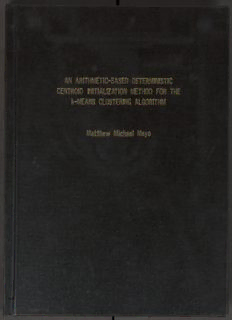
An Arithmetic-Based Deterministic Centroid Initialization Method for the k-Means Clustering Algorithm PDF
Preview An Arithmetic-Based Deterministic Centroid Initialization Method for the k-Means Clustering Algorithm
CCoolluummbbuuss SSttaattee UUnniivveerrssiittyy CCSSUU eePPrreessss Theses and Dissertations Student Publications 5-2016 AAnn AArriitthhmmeettiicc--BBaasseedd DDeetteerrmmiinniissttiicc CCeennttrrooiidd IInniittiiaalliizzaattiioonn MMeetthhoodd ffoorr tthhee kk--MMeeaannss CClluusstteerriinngg AAllggoorriitthhmm Matthew Michael Mayo Follow this and additional works at: https://csuepress.columbusstate.edu/theses_dissertations Part of the Computer Engineering Commons RReeccoommmmeennddeedd CCiittaattiioonn Mayo, Matthew Michael, "An Arithmetic-Based Deterministic Centroid Initialization Method for the k- Means Clustering Algorithm" (2016). Theses and Dissertations. 241. https://csuepress.columbusstate.edu/theses_dissertations/241 This Thesis is brought to you for free and open access by the Student Publications at CSU ePress. It has been accepted for inclusion in Theses and Dissertations by an authorized administrator of CSU ePress. Columbus State University D. Abbott Turner College of Business and Computer Science The Graduate Program in Applied Computer Science An Arithmetic-based Deterministic Centroid Initialization Method for the fc-Means Clustering Algorithm A Thesis in Applied Computer Science by Matthew Michael Mayo Submitted in Partial Fulfillment of the Requirements for the Degree of Master of Science May 2016 Abstract One of the greatest challenges in k-means clustering is positioning the initial cluster centers, or centroids, as close to optimal as possible, and doing so in an amount of time deemed reasonable. Traditional fc-means utilizes a randomiza- tion process for initializing these centroids, and poor initialization can lead to increased numbers of required clustering iterations to reach convergence, and a greater overall runtime. This research proposes a simple, arithmetic-based deterministic centroid initialization method which is much faster than ran- domized initialization. Preliminary experiments suggest that this collection of methods, referred to herein as the sharding centroid initialization algo- rithm family, often outperforms random initialization in terms of the required number of iterations for convergence and overall time-related metrics and is competitive or better in terms of the reported mean sum of squared errors (SSE) metric. Surprisingly, the sharding algorithms often manage to report more advantageous mean SSE values in the instances where their performance is slower than random initialization. iii Contents Abstract iii List of Figures List of Tables ix List of Algorithms x List of Source Code xi 1 Introduction 1 1.1 Problem Definition 4 1.2 Proposed Method 6 1.3 Expected Results 7 1.4 Thesis Outline 8 2 Previous Work 10 2.1 Improvements to Random Initialization 11 2.2 Alternatives to Random Initialization 12 iv 3 Methodology 15 3.1 The &-means Clustering Algorithm 15 3.2 Random Centroid Initialization 18 3.3 Sharding Centroid Initialization 21 3.3.1 Naive Sharding 21 3.3.2 Mean Sharding 24 3.3.3 Median Sharding 25 3.4 Measuring Success 26 4 Implementation 28 4.1 Python 29 4.2 Implementation Overview 31 4.3 &-means Clustering Algorithm 33 4.4 Random Centroid Initialization 35 4.5 Sharding Centroid Initialization 36 4.5.1 Naive Sharding 37 4.5.2 Mean Sharding 40 4.5.3 Median Sharding 40 4.6 Utility Modules 41 4.7 Testing Apparatus 41 5 Results and Evaluation 43 5.1 Experiment Overview 43 5.2 Datasets 46 5.2.1 Research-specific Artificial Datasets 47 v 5.2.2 Datasets of Known Clusters from the Literature .... 54 5.2.3 Datasets of Unknown Clusters from Literature 64 6 Conclusions 70 6.1 Summary of Research 70 6.2 Future Work 74 A Computer Specifications 76 B Artificial Dataset Names 78 Bibliography 79 vi List of Figures 1.1 A proposed classical machine learning algorithm taxonomy. . . 3 3.1 Sorting by composite value and sharding 22 3.2 Shard attribute means become centroid attribute values. ... 23 4.1 Python popularity among the analytics community 30 4.2 Project tree structure 32 4.3 kmeans.py module overview 37 5.1 Dessewffy dataset - 48 5.2 Dessewffy naive sharding versus random initialization, k = 3. . 49 5.3 Dessewffy naive sharding versus random initialization, k = 7. . 50 5.4 Jelonek dataset 52 5.5 Jelonek naive sharding versus random initialization, k — 3. . . 52 5.6 Jelonek naive sharding versus random initialization, k = 7. . . 53 5.7 Ruspini random centroid initialization, k = 4 55 5.8 Ruspini naive sharding centroid initialization, k — 4 56 5.9 Ruspini mean sharding centroid initialization, k = 4 57 5.10 Ruspini median sharding centroid initialization, k = 4 58 vii 5.11 Iris parallel coordinates visualization 61 6.1 Number of iterations of datasets with known number of clusters. 72 6.2 Number of iterations of datasets with class attributes 73 viii List of Tables 5.1 Dataset summary 47 5.2 Dessewffy results 50 5.3 Jelonek results • • 53 5.4 Ruspini results 59 5.5 Iris results (without class) 61 5.6 Iris results (with class) 61 5.7 Wine results (without class) 63 5.8 Wine results (with class) • • 63 5.9 Seeds results (without class) 64 5.10 Seeds results (with class) 64 5.11 3D Road Network results 66 5.12 Power consumption results • • 67 5.13 Summarized results of datasets of known clusters 68 5.14 Summarized results of datasets of unknown clusters 69 A.l Experiment computer hardware 77 IX
Description: